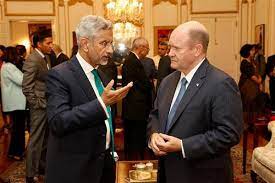WASHINGTON: The governments of India and Canada will have to talk to each other and see how they resolve their differences over the death of a Khalistani separatist, External Affairs Minister S Jaishankar has said, asserting that the larger issue of “permissiveness” must be flagged and addressed.
During an interaction with Indian journalists here on Friday, he said India was ready to look into the information related to Canada’s allegations of the “potential” involvement of Indian agents in the killing of Khalistani extremist Hardeep Singh Nijjar on June 18 in British Columbia.
“The issue is as follows, which is that the Canadians have made some allegations. We have pointed out to them that this is not the government of India’s policy, but if they are prepared to share with us specifics and anything relevant, we are also open to looking at it. So in that sense, that’s where the matter stands,” Jaishankar said.
“But what we do not want to see is an incident treated in isolation because then that somewhere does not convey the right picture,” he said.
Jaishankar said India has had an ongoing problem with Canada and its government for some years now, and the problem really revolves around the “permissiveness in regard to terrorism, extremism and ballots,” he said.
“This permissiveness is also reflected in the fact that some important extradition requests have not been responded to from their side in the fact that there are individuals and organisations who are clearly involved with violence and illegal activities in India who themselves declared it. I mean it is not a secret and that they continue to carry on with their activities in Canada,” he said.
Jaishankar said one of the problems is no incident is isolated as there is a context for everything.
“There are multiple problems out there. So, I guess in the case of individual incidents, the governments concerned will have to talk to each other and see how they sort of take it forward,” he said.


